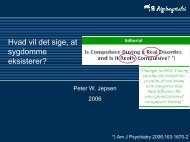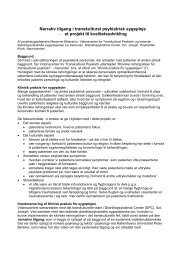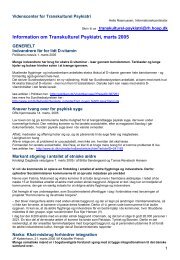Information om Transkulturel Psykiatri, marts 2009 - Videnscenter for ...
Information om Transkulturel Psykiatri, marts 2009 - Videnscenter for ...
Information om Transkulturel Psykiatri, marts 2009 - Videnscenter for ...
Create successful ePaper yourself
Turn your PDF publications into a flip-book with our unique Google optimized e-Paper software.
<strong>Videnscenter</strong> <strong>for</strong> <strong>Transkulturel</strong> <strong>Psykiatri</strong>. <strong>Psykiatri</strong>sk Center København<br />
Helle Rasmussen, <strong>In<strong>for</strong>mation</strong>skoordinator<br />
mental illness is expressed; but others are more up-to-date, but still do not really address the issue of how<br />
culture affects the process of mental health assessment and diagnosis in a practical sense.<br />
The definition of what ‗‗race‘‘ means too is inconsistent across the book. For example, in the chapter ‗‗Mental<br />
health of the ageing immigrant population‘‘, ‗‗race‘‘ is seen as a genetic entity while in other chapters (<strong>for</strong><br />
example in ‗‗Racism, racial events and mental ill health‘‘) ‗‗race‘‘ is interpreted in the more modern sense as<br />
a socially constructed entity (see Omi & Winant, 1994). What is striking though is that, except in the case of<br />
the chapter on the mental health of refugees and asylum seekers (see below), the concept of psychiatric<br />
‗‗illness‘‘ is taken throughout the book as s<strong>om</strong>ething ‗‗given‘‘ – a rarefied ‗‗thing‘‘ that is applicable irrespective<br />
of cultural background or context. In other words the knowledge within ethno-psychiatry and the critiques of<br />
the narrow (western) medical model of illness so often voiced in the transcultural psychiatry world – and<br />
indeed by users (‗‗consumers‘‘) of mental health services who c<strong>om</strong>e fr<strong>om</strong> non-western cultural backgrounds<br />
– are not taken on board to any extent in any of the chapters.<br />
Having outlined the limitations of this book as a whole, it must be said that there are s<strong>om</strong>e chapters that may<br />
be useful <strong>for</strong> practising mental health professionals. Training in ‗‗cultural c<strong>om</strong>petence‘‘ and the more popular<br />
(in UK) ‗‗diversity training‘‘ is discussed in several chapters. The chapter ‗‗Diversity training <strong>for</strong> psychiatrists‘‘<br />
by two child and adolescent psychiatrists, Nisha Dogra andKhalid Karim, covers the topic fairly<br />
c<strong>om</strong>prehensively and trainees in psychiatry could gain fr<strong>om</strong> studying this. The most useful and well written<br />
chapter that all mental health professionals should read is ‗‗Intellectual disability and ethnicity; achieving<br />
cultural c<strong>om</strong>petence‘‘ by Jean O‘Hara, a consultant in psychiatry of intellectual disability. Another chapter<br />
that is easy to read and in<strong>for</strong>mative is ‗‗Mental health of refugees and asylum seekers‘‘ by Rachel Tribe,<br />
professor of psychology at University of East London (UK). Racism features in several chapters; although it<br />
is never dealt with very adequately vis-a-vis its effect via institutional racism on the practice of psychiatry<br />
itself, s<strong>om</strong>ething written about quite a lot in the UK recently (e.g., by Bhui, 2002; Fernando, 2010) and often<br />
raised by people who use mental health services. Un<strong>for</strong>tunately, chapters that should have dealt with racism<br />
in the clinical encounter and with institutional racism in the practice of psychiatry fail to address the major –<br />
although contentious – clinical issues around diagnosis, recently explored so well in the book The Protest<br />
Psychosis: How Schizophrenia Became a Black Disease by Jonathan Metzl (<strong>2009</strong>).<br />
In conclusion, this is a book <strong>for</strong> psychiatric libraries in the UK to hold – libraries that do not subscribe to the<br />
journal Advances in Psychiatric Treatment – so that it may be accessed by psychiatric trainees in the UK<br />
studying <strong>for</strong> the examinations set by the Royal College of Psychiatrists, assuming (as implied by the editors<br />
of the book) that it represents the sort of answers required at these examinations. A few chapters noted<br />
above may be useful <strong>for</strong> other professional groups in the mental health field, but not many. It is noteworthy<br />
that no less than 30 of the 34 authors are psychiatrists, including four trainees. There are no contributors<br />
who speak <strong>for</strong> users (consumers) of mental health services or <strong>for</strong> carers of people with mental health<br />
problems; in fact their roles and viewpoints are hardly ever mentioned except <strong>for</strong> a brief reference to carers<br />
of people with dementia and a good account of the roles of carers in minority ethnic c<strong>om</strong>munities in the<br />
chapter on intellectual disability and ethnicity. Finally, there are no contributions fr<strong>om</strong> any of the several nongovernmental<br />
organizations that have developed mental health services <strong>for</strong> British minority ethnic<br />
c<strong>om</strong>munities (Fernando, 2005; Fernando & Keating, <strong>2009</strong>) – a very serious deficiency indeed because they<br />
have been in the <strong>for</strong>efront of providing mental health services that are considered to be sensitive to the<br />
needs of black and minority ethnic people in the UK.<br />
References<br />
Bhui, K. (Ed.). (2002). Racism and mental health: Prejudice and suffering. London, UK:<br />
Jessica Kingsley. Carstairs, G. M., & Kapur, R. L. (1976). The great universe of Kota: Stress, change, and<br />
mental disorder in an Indian village. Berkeley: University of Cali<strong>for</strong>nia Press.<br />
Cox, J. (Ed.). (1986). Transcultural psychiatry. London, UK: Cro<strong>om</strong> Helm.<br />
De Rueck, A. V. S. & Porter, R. (Eds.). (1965). Transcultural Psychiatry. Ciba Foundation Symposium.<br />
London, UK: Churchill.<br />
Eagleton, T. (2000). The idea of culture. Ox<strong>for</strong>d, UK: Blackwell.<br />
Fernando, S. (1988). Race and culture in psychiatry. London, UK: Cro<strong>om</strong> Helm.<br />
Fernando, S. (2005). Multicultural mental health services: Projects <strong>for</strong> minority ethnic c<strong>om</strong>munities in<br />
England. Transcultural Psychiatry, 42(3), 420–436.<br />
Fernando, S. (2010). Mental health, race and culture (3rd ed.). Basingstoke, UK: Palgrave Macmillan.<br />
Fernando, S. & Keating, F. (Eds.). (<strong>2009</strong>). Mental health in a multi-ethnic society: A multidisciplinary<br />
handbook (2nd ed.). London, UK: Routledge.<br />
Gaines, A. D. (1992). Ethnopsychiatry: The cultural construction of professional and folk psychiatries. New<br />
York: State University of New York Press.<br />
13






